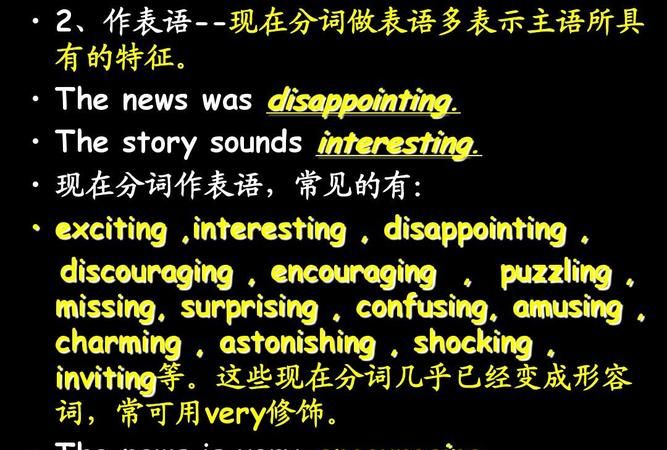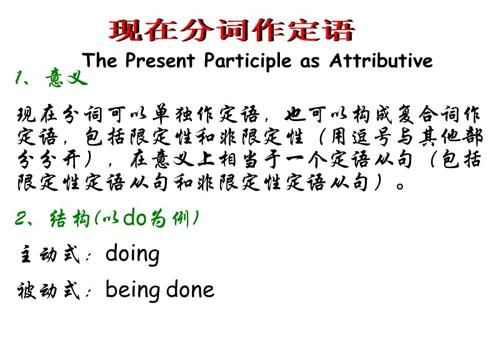本文目录
现在分词什么意思?现在分词是什么意思?
1、现在分词(present participle)(又称-ing形式,现在进行时),是分词的一种,分词又分为现在分词和过去分词,它们都是非限定动词,现在分词在句子里面不能充当谓语,但能充当其它的一些成分(定语,表语,补语,状语),并且它们具有动词的性质,所以又是类动词的一种。一般式:doing; 一般被动式:being done; 完成式:having done; 完成被动式:having been done。 所有否定式都是在-ing前面加not ,包括独立主格形式。
2、现在分词在英语这一科目中,也是比较重要的一部分,具有双重性,一面具有动词的特征,可以有自己的宾语和状语;另一面具有形容词和副词的特征,可以充当表语,定语,状语,补足语,可以表示主动或正在进行的动作,是非谓语动词的一种。

现在分词定语的含义
现在分词是动词的一种形式,通常在原形动词的基础上加ing现在分词用于进行时态(例如现在进行时或过去进行时)例:I was cooking when my mother came home (was cooking 过去进行时的动词结构)Are they having an Eng...

现在分词的作用及其用法和举例
1) 构成谓语用于表示进行时态
* Listen! She is singing an English song. 听!她正在唱英语歌。
* What were you talking just now? 你们刚才在谈论什么?
* I have been writing a book recently. 我最近一直在写一本书。
* They will be meeting us at the station. 他们会在车站上接我们的。
2) 构成不定式的进行形式
* They are said to be building another bridge across the street. 据说他们正在街道对面修建另一座桥。
* They seemed to be talking about something important. 他们好像正在谈论一些很重要的事情。
* When I went to his home, he happened to be traveling around the world. 当我到达他家时,他刚好环游世界去了。
3) 作表语
现在分词作表语时, 其动作意味很弱, 在功能上更接近形容词。不少词已经演化为正式的形容词。
* What he said was very encouraging. 他的话很鼓舞人心。
* The flowers look charming after the rain. 雨后的鲜花看上去很漂亮。
* It was amazing that the boy was able to solve the problem so quickly. 那男孩能这么快解决这个问题真是令人惊奇。
* It is frightening for her to think of that ghost story. 她想到那个鬼故事就毛骨悚然。
4) 作定语
a) 作前置定语
* He is a promising young man. 他是一个有前途的年轻人。
* This is a pressing question. 这是一个紧迫的问题。
* There was an embarrassing silence after his joke. 他讲完笑话之后,是一阵令人尴尬的沉默。
* The story had a satisfying ending. 这故事有一个令人满意的结局。
* Can you stop the running horse? 你可以阻止那辆正在奔跑的马吗?
* The sleeping boy is Tom. 正在睡觉的男孩叫汤姆。
b) 作后置定语, 位于所修饰的名词之后。
* A little child learning to walk often falls. 学走路的小孩经常跌倒。
* Did you know the girl dancing with your brother? 你认识和你哥哥跳舞的那个女孩子吗?
* Who is the woman being operated on? 正在动手术的女人是谁?
* Three days later I received a letter offering me the job. 三天后我收到了提供我这份工作的信。
* The freeway being built now will lead to Xigang Seaport. 正在建设的高速公路将直通新港码头。
* They lived in a room facing the east. 他们住在一间朝东的房间里。
c) 现在分词作定语时与动名词构成的合成词的区别:
现在分词表示所修饰的名词的动作,而动名词表示用途,目的等。
现在分词:
a flying bird 飞行的鸟
a swimming boy 正在游泳的男孩
a sleeping child 熟睡的孩子
动名词:
waiting room 候车室
a swimming suit 泳衣
a sleeping bag 睡袋
5) 构成复合宾语 (即作宾语补足语)
a) 动词 + 名(代)词 + 现在分词
* When we arrived, we found him sleeping. 我们到达时发现他在睡觉。
* He left me waiting here. 他留下我等在这。
* Don't have the students studying all day. 不要让学生整天都在学习。
* When he awoke,he found himself being looked after by an old woman. 他醒来的时候发现一位老大娘正在照顾他。
* Soon they could see the steam rising from the wet clothes. 很快他们会看见蒸汽从湿衣服上升起。
* I imagined myself performing before a clapping audience. 我想象自己在鼓掌的观众面前表演节目。
* Do you hear someone knocking at the door? 你听到有人正在敲门吗?
动词有时以被动形式出现。
* The missing boy was last seen playing near the river. 那个失踪的男孩最终被人们发现正在河边玩耍。
* A cook will be fired if he is found smoking in the kitchen. 厨师如果被发现在厨房抽烟将会被开除。
b) 介词 + 名(代)词 + 现在分词 【高中以上】
* She fell asleep with the light burning. 她睡着了,灯开着。
* Without anyone noticing, he slipped through the window. 没人注意,他从窗户溜出去了。
* With the boy leading the way, we quickly found the house. 有男孩带路,我们很快找到那所房间。
* The English class ended with all students singing an English song. 英语课以全体学生合唱一首英语歌而结束。
6) 作状语
a) 作状语表目的或伴随动作
* The six blind men stood there begging for a meal. 六个瞎子站在那儿要饭。
* A search party went into the cave hoping to find buried treasure. 一个探寻小队进入山洞里,希望可以找到埋藏的宝藏。
* What are you busy doing these days? 你这些天都在忙些什么?
* Over 20,000 people were there watching the football match. 有两万多人在那里看足球赛。
b) 置于句前或句后,与句子常有逗号隔开,表示伴随的动作。
* He sat in the armchair, reading a newspaper.他坐在扶手椅里读报。
* The children ran out of the room, laughing and talking merrily. 那些孩子们跑出房间,愉快地笑着、说着。
* "Can't you read?" Mary said angrily, pointing to the notice. “你不识字吗?”玛丽指着告示,很生气地说。
* I stood by the door, not daring to say a word. 我站在门边,一句话都不敢说。
* Following the guide, they started to climb. 跟随者导游,他们开始了攀爬。
* Coming into the room, I saw a girl crying. 走进房间,我看到一个女孩正在哭泣。
c) 作句子状语,说明说话人的看法。
* Generally speaking, the most important news is on the front page. 一般而言,最重要的新闻都放在头版。
* Taking everything into account, his decision is not so bad. 把一切考虑在内,他的决定也不算坏。
* Talking of the football math, do you know which side won? 谈到足球赛,你知道那一边赢了吗?
* Considering the bad weather, the sports meeting was delayed. 考虑到坏天气的影响,运动会推迟了。
d) 表原因
* Being so poor at that time, we couldn't afford to buy a TV set. 那时我们非常穷,没有钱买电视。
* Seeing nobody at home, he decided to leave a note. 发现没人在家,他决定留个字条。
* Not knowing what to do, he went to his parents for help. 由于不知如何办是好,他去找父母帮忙。
* The doctor, not wishing to make her nervous, didn't fully explain the seriousness of her condition. 医生为了不使她紧张,没有完全向她讲明病情的严重性。
e) 表示一个动作一发生,另一个动作随即发生。
* He went out shutting the door behind him. 他走出去,关上了门。
* Hearing their teacher's voice, the pupils stopped talking at once. 一听到教师的声音,学生们立即停止讲话。
f) 与连词 when 或 while 连用。
* Don't be careless when having an exam. 考试时不要粗心。
* When hearing the news, they all danced for joy. 当听到这个消息的时候,他们都高兴得手舞足蹈。
* While watching TV in the room, we heard someone knocking at the door. 我们在看电视的时候听到有人在敲门。
* While waiting there, he saw two pretty girls come out of the building. 在那里等待的时候,他看见两个漂亮的女孩子从楼里走出来。
g) 表示在做某事过程中, 发生某事或做某事。
* Walking in the street, I saw him.当我在街上走时,我看到他了。
* Wandering through the street,he caught sight of a tailor's shop.逛街时,他看到一家裁缝铺。
h) 表示结果
* Her husband died ten years ago,leaving her with three children to look after. 她丈夫十年前去世了,撇下她和三个孩子。
* Their car was caught in a traffic jam, thus causing the delay. 他们的车遇上交通阻塞,因而耽误了。
* European football is played in more than 80 countries, making it the most popular sport in the world. 欧式足球在80个国家开展,使得欧式足球成为世界上最受欢迎的体育运动。

英语现在分词的变化规则是什么
分词可以和be动词,在句子中做谓语,构成进行时态。
不作谓语时,
分词(包括现在分词和过去分词)主要起形容词和副词作用,在句中充当表语、定语、宾语(或主语)的补足语和状语等。
1) 作表语。这时,现在分词常常表示特性,过去分词表示状态。例如:
His argument is very convincing. 他的论点很令人信服。
They were very excited at the news. 听到这个消息,他们非常激动。
【注】注意不要将作表语的分词和构成进行时态和被动语态的分词混淆起来。试比较:
a) The present situation is encouraging. (分词作表语)当前的形势令人鼓舞。
The present situation is encouraging us to continue our experiment. (分词构成进行时)当前的形势正在鼓舞我们继续试验。
b) The cup was broken. (分词作表语)杯子破了。
The cup was broken by John. (分词构成被动语态)杯子是约翰打破的。
2) 作定语。例如:
Don’t disturb the sleeping child. 不要惊扰这个酣睡的孩子。
The arrested murderer will be tried soon. 那个被逮捕的谋杀者不久将受到审讯。
【注】分词作定语的位置
分词作定语时,若是单个分词作定语通常是前置修饰语(Pre-modifier),如上面例句所示;若是分词短语作定语则应置于被修饰词的后面(Post-modifier),其作用相当于一个省略了的定语从句。例如:
You may ask the lady (who is) sitting at the desk. 你可以问一问坐在桌子旁边的那位女士。
Those (who have been) elected as committee members will attend the meeting. 当选为委员的人将出席这次会议。
3) 作宾语(或主语)的补足语。例如:
He likes to sit on the beach and watch the sea gulls flying. 他喜欢坐在海边看海鸥飞翔。
The work left everyone exhausted. 那个任务使得人人疲意不堪。
【注】(1)常跟分词作宾补的动词有:
catch(偶然发觉) have(让,使) keep(使处于某状态)
get(使得) see(看见) hear(听见)
find(发现) feel(感觉到) leave(使处于某状态)
make(使) want(想要) start(引起)
notice(注意到) observe(观察) watch(注视)
set(使处于某状态)
(2)现在分词和不定式作宾语补足语在含义上的区别
有些动词如:see, hear, feel, notice, watch等既可跟现在分词也可跟不定式作复合宾语。它们之间的区别在于:现在分词着重说明动作正在发生;不定式着重说明动作的全过程。试比较:
I saw the boys climbing the wall. 我看见孩子在爬墙。
I saw the boys climb the wall. 我看见孩子爬墙了。
4) 作状语。分词作状语是中国学生学习分词用法的难点和重点。
(1)作时间或原因状语,通常位于句子前面。例如:
Hearing the knock on the door, they stopped talking.
(=When they heard...) 听见有人敲门,他们停止了谈话。
Asked to work overtime that evening, I missed a wonderful film. (As I was asked to...)
由于那天晚上被要求加班,我错过了一场精彩的电影。
(2)作方式、陪衬或结果状语,通常位于句末。例如:
They stood there waiting for the bus. (and were waiting.) 他们站在那儿等公共汽车。
The bandits fled into the mountains, pursued by the policemen. (and were pursued...) 匪徒向山里逃窜,警察在后面追捕着。
The hunters fired, wounding one of the wolves. (and wounded one of the wolves)猎人开了枪,击伤了那群狼中的一只。
5) 分词的独立结构(Absolute Participial Construction)
分词作状语时,要特别注意其逻辑主语须和谓语动词的主语一致。否则,分词必须有自己的主语。这种带主语的分词结构叫作分词的独立结构,或独立主格(Absolute Construction)(参见本讲 12.1-2-1“不定式的独立主格”)例如:
The rain having stopped, the soldiers continued their march. 雨停了,战士们又继续行军了。
The boys returned, their face covered with sweat. 孩子们回来了,满脸是汗。
【注】以下几种情况也可看作分词独立结构的演变用法:
1) 省略了分词being的独立结构。例如:
The teacher entered the classroom, a bag (being) in his hand. 老师手上提着一个包走进了教室。
He stopped and turned about, his eyes (being) brightly proud. 他停下来,四处看了看,眼睛里充满了自豪的表情。
Breakfast over, he went to his office. 吃完早饭,他就去办公室了。
2) 介词with和without引导的独立结构(Prepositional Absolute Construction),有时带有分词;有时则无分词,但也可看作省略了分词being。例如:
She left the room with the candle burning on the table. 她没有熄灭桌上的蜡烛就离开了屋子。
He wandered in without shoes or socks on. 他慢悠悠地走进来,既没有穿鞋,也没有穿袜子。
6) 作插入语(Parenthesis)
有时也称“独立成分”,其作用相当于句子状语。
Generally speaking, I prefer rice to noodles. 一般地说,我宁愿吃米饭而不吃面条。
Judging from his accent, he must be a southerner. 从他的口音听来,他一定是南方人。

以上就是关于现在分词有什么意义,现在分词什么意思?现在分词是什么意思?的全部内容,以及现在分词有什么意义 的相关内容,希望能够帮到您。
